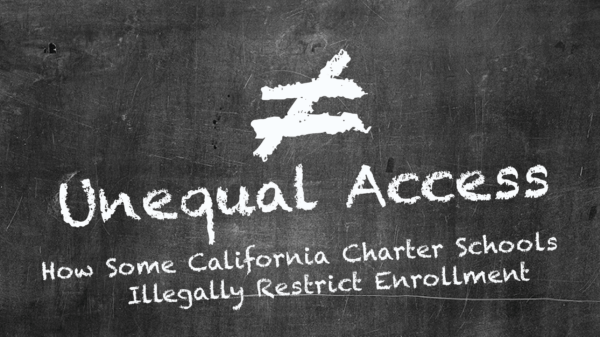Unequal Access: Methodology
To collect our data, we visited the California Department of Education’s directory of charter schools and identified roughly 1,000 charter schools in all 58 California counties. We visited the websites of each listed charter school and examined all available enrollment instructions and documents, which some listed under "admissions" or "application." We then examined any "parent involvement" or "volunteer" pages or sections on the school website. Finally, we searched the websites for parent or student-parent handbooks and reviewed any that were available online. Some schools did not post their enrollment or school policies online; we were unable to review these policies. However, most charter schools posted at least some of these policies, so we were able to review a substantial cross-section of California charter schools.
In the schools’ online materials, we searched for five primary enrollment policy violations based on whether the school (1) posted any academic admissions qualifications or any academic requirements to remain enrolled, (2) maintained any English proficiency requirements for enrollment, (3) posted any pre-enrollment interview or essay requirements, (4) required a Social Security number or birth certificate or asked questions regarding student citizenship, and (5) required parents to volunteer at the school.
- First, we reviewed the materials for academic requirements. We categorized schools as maintaining an illegal requirement when they included G.P.A. standards, credit completion minimums, requirements for academic progress, or similar mandatory policies for either initial or continued enrollment.
- Second, we looked for any policies that excluded English learners. We categorized the school as having illegal or exclusionary policies if students were required to have a minimum level of proficiency; if students were required to have minimum test scores on English proficiency tests; or if parents were required to be proficient in English or were otherwise penalized for not being proficient in English.
- Third, we looked for any pre-enrollment interview or essay requirements. We categorized the school as having an exclusionary policy if it explicitly asked for an essay by either the student or parent or if the school’s application involved questions requiring substantive, long-form answers. We also categorized the school as having an exclusionary policy if it stated that enrollment was conditioned upon an "interview," "audition," "appointment," or "meeting" with students or parents.
- Fourth, we examined application forms and lists of required enrollment materials to see whether they required a Social Security number or birth certificate. We categorized a school as having exclusionary policies when its materials stated that such items were required or asked for these items without providing possible alternatives, indicating that they were optional, or indicating that foreign documents would be accepted. We also categorized a school as having exclusionary policies when it asked about a student’s citizenship status or birth country without providing any disclaimer that this information would not affect enrollment.
- Fifth, we searched for policies requiring parents or family members to volunteer at the school or donate money to the school as a condition for enrollment. We categorized schools as having an illegal policy requiring volunteer hours when the policies used the words "required" or "requirement" in relation to parent volunteering, when policies conditioned student enrollment on parents signing a volunteer commitment, or when policies threatened to disenroll or otherwise penalize students whose Page 2 of 10 parents did not complete a given number of volunteer hours
Related Content

